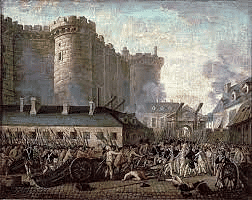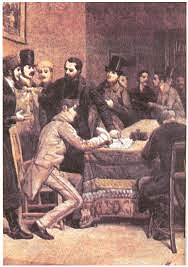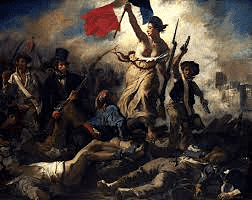Key Concepts - The French Revolution | Social Studies (SST) Class 9 PDF Download
French Society During the Late Eighteenth Century
- Louis XVI: The King of France in the late 18th century, known for his financial issues and his part in the events leading to the French Revolution.
- Marie Antoinette: The Queen of France and wife of Louis XVI, often criticised for her lavish lifestyle during tough economic times.
- Versailles: A grand palace near Paris, symbolising royal extravagance.
- American Revolution: The conflict for American independence from Britain, with support from France.
- French debt crisis: Severe financial troubles caused by wars and palace expenses.
- Three Estates: French society before the revolution was divided into clergy, nobility, and commoners.
- Old Regime: The social and political structure of France prior to the revolution.
- Feudal privileges: Special rights and exemptions enjoyed by the nobility.
- Tithes: Required church taxes that peasants had to pay.
- Taxes (taille, indirect): Direct and indirect taxes, with taille being the most important.
- Subsistence crisis: A shortage of affordable basic necessities, like food.
- Middle class: A growing group of professionals, merchants, and educated individuals.
- Overseas trade: Trade with foreign nations that supported the rise of the middle class.
- Philosophers: Thinkers such as John Locke, Rousseau, and Montesquieu who shaped Enlightenment ideas.
- Estates General: A political assembly that the monarch had to summon to introduce new taxes, representing the three estates.

- Social contract: The idea of a mutual agreement that forms the basis of government.
- American Constitution: The foundational document of the U.S., serving as a model for France.
- Salons and coffee-houses: Places where people gathered for intellectual discussions.
- Enlightenment: An 18th-century movement focusing on reason, individual rights, and progress.
- Louis XVI had to increase taxes for the reasons discussed in the previous section.
- Danton: A key figure in the early part of the French Revolution.
- Arthur Young: An English traveller and writer, critical of French society, advocating for the rights and welfare of the oppressed.
The Outbreak of the Revolution
- Estates General: A pre-revolutionary assembly made up of representatives from three estates - clergy, nobility, and commoners - called by the monarch in 1789 to discuss important laws.
- Old Regime: The social and political system in France before the Revolution, marked by feudal privileges and widespread unhappiness among common people, especially during Louis XVI's rule.
- Third Estate: The largest estate representing commoners, which included peasants, artisans, and the bourgeoisie, played a crucial role in the French Revolution.
- National Assembly: Created by the Third Estate, this revolutionary group claimed to be the true representative of the French people and vowed not to disperse until they had written a constitution to limit the monarch's powers.
- Mirabeau: A noble who supported the revolution, born into a noble family but believed in ending a society based on feudal privileges.
- Abbé Sieyès: A clergyman and political thinker who helped form the National Assembly and fought for the rights of the Third Estate.
- Bastille: A fortress and prison stormed by a crowd on July 14, 1789, which became a symbol of the start of the French Revolution and the people's fight against oppression.
- Feudal system: A medieval social structure where land was owned by nobles in exchange for loyalty and service, often requiring peasants to pay taxes and fulfill obligations.
- Constitutional monarchy: A system of government where the monarch's powers are limited by a constitution, which restricts their authority.
- Declaration of the Rights of Man and Citizen: A key document of the French Revolution that outlined individual rights and the principle of equality before the law.
- Active citizens: Individuals who could vote and engage in political activities, meeting certain requirements like age and tax payment.
- Passive citizens: Those who were excluded from political participation, including women, who did not have voting rights during this time.
- Electors: Individuals selected by active citizens to take part in representative elections, serving as a middle step in the electoral process.
- National Constitution of 1791: This document established a constitutional monarchy in France, distributing governmental powers among various institutions.

France Abolishes Monarchy and Becomes a Republic
- Louis XVI's Secret Negotiations: Although he signed the Constitution, Louis XVI secretly talked to the King of Prussia, raising political tensions and worries about foreign interference.
- Revolutionary Wars: A series of battles started by the French Revolution, where France fought against other European monarchies, leading to economic troubles and loss of life.
- Jacobins: A radical political group led by Maximilian Robespierre, pushing for revolutionary changes and social justice. They organised an uprising due to shortages and high food prices, motivating their actions.
- Sans-culottes: Ordinary people in revolutionary France who wore long trousers, distinguishing them from the nobility's knee breeches, symbolising their opposition to aristocracy.
- On the morning of August 10, they stormed the Palace of the Tuileries, killing the king's guards and taking the king hostage for several hours.
- Reign of Terror: A time of strict control and punishment from 1793 to 1794, marked by mass executions of those seen as enemies of the republic. Robespierre's regime targeted former nobles, clergy, and even members of his own political group.
- Execution of Louis XVI: Louis XVI was found guilty of treason and executed publicly at the Place de la Concorde on January 21, 1793. His wife, Marie Antoinette, faced the same fate shortly after.
- Directory: The political instability of the Directory created opportunities for the rise of a military leader, Napoleon Bonaparte.
- Role of Women: Women played a significant role in the revolution, fighting for their rights and social changes, which were vital to the social dynamics of that time.
- Freedom, Equality, Fraternity: Core values of the French Revolution that symbolise liberty and unity among citizens, inspiring future political movements.
The Abolition of Slavery
- Abolition of Slavery: One of the most significant social changes during the Jacobin regime was the end of slavery in French colonies. In 1794, the Convention passed a law to free all slaves in French overseas territories.
- Caribbean Colonies: French territories in the Caribbean, like Martinique, Guadeloupe, and San Domingo (Haiti), were vital for producing goods such as tobacco, indigo, sugar, and coffee. However, Europeans were often unwilling to work in these distant and unfamiliar locations, leading to a labour shortage on the plantations.
- Triangular Slave Trade: This was a historical trade route involving Europe, Africa, and the Americas, which facilitated the movement of slaves from Africa to the New World. The trade began in the seventeenth century, with French merchants sailing from ports like Bordeaux or Nantes to the African coast to purchase slaves from local leaders.
- Exploitation of Slave Labor: Enslaved individuals were forced to work on plantations, especially for producing sugar, coffee, and indigo, to satisfy European market demands. Port cities such as Bordeaux and Nantes thrived economically due to the booming slave trade.
- Slave Trade: The trade of buying and selling enslaved people became a lucrative business for European merchants in the 17th century. This process involved branding and shackling slaves, who were cramped into ships for a three-month journey across the Atlantic to the Caribbean, where they were sold to plantation owners.
- Plantation Owners: These were individuals who owned large agricultural estates, often depending on enslaved labour for profit. Plantation owners believed their freedom included the right to enslave African people to fulfil their economic goals.
- African Enslaved Individuals: Enslaved Africans were taken to the New World, usually under harsh conditions, to work on plantations. Slavery was ultimately abolished in French colonies in 1848, but this initial abolition was short-lived as Napoleon reinstated slavery ten years later.
- Slavery Abolition (1848): The complete emancipation of enslaved individuals in French colonies in 1848 marked the end of slavery in these areas.

The Revolution and Everyday Life
- Abolition of Censorship: The removal of censorship was a major change from the Old Regime, where the king's censors had to approve all written material. This change allowed for free expression of ideas and information.
- Declaration of the Rights of Man and Citizen: This important document proclaimed that freedom of speech and expression is a natural right, ensuring essential rights during the French Revolution.
- Freedom of the Press: The ability to publish without government control enabled the expression of different views, encouraging open communication and debate in society.
- Political Philosophers: Thinkers like Rousseau and Voltaire influenced political ideas through their writings, although their works were often too complex for most people, limiting the spread of revolutionary concepts.
- Printed Pictures: Newspapers, pamphlets, books, and printed images flooded French towns and quickly reached rural areas, spreading political messages widely.
- Opposing Views: Different opinions were freely discussed in the press, with each side trying to persuade others through print.
- Festive Processions: Celebratory events allowed the public to engage with revolutionary ideas, attracting large crowds and creating a sense of community around concepts like liberty and justice.
- Liberty and Justice: Core ideas of freedom and fairness were shared with a larger audience through various media, helping revolutionary ideals resonate with the people.
One significant law that was enacted soon after the storming of the Bastille in the summer of 1789 was the abolition of censorship. The Declaration of the Rights of Man and Citizen stated that freedom of speech and expression is a natural right. Newspapers, pamphlets, books, and printed pictures spread throughout France, quickly reaching the countryside and discussing the events and changes happening in the country. Freedom of the press meant that different views on events could be shared, enriching public conversations.
Plays, songs, and festive processions drew large crowds, helping people understand and connect with ideas like liberty and justice that political philosophers wrote about, often in texts that were only accessible to a small number of educated individuals.
Important Events
1774 - Louis XVI Becomes King
- Louis XVI ascends to the throne of France, inheriting a nation plagued by an empty treasury and widespread unrest among the populace of the Old Regime. The country faced enormous debt from wars and extravagant spending.
July 14, 1789 - Storming of the Bastille
- A crowd of about 7,000 people in Paris stormed the Bastille, a fortress prison that symbolised royal oppression. This event marked the start of the French Revolution.
1789 - Calling of the Estates-General
- Louis XVI convenes the Estates-General, a political assembly representing the three estates of France: clergy, nobility, and commoners, to tackle financial crises.
- On June 20, 1789, members of the third estate, representing commoners, declared themselves a National Assembly and vowed to draft a constitution to limit the king's power, led by Mirabeau and Abbé Sieyès, who sought to abolish feudal privileges.
1791 - Constitution Framed
- A constitution is created to restrict the king's powers and guarantee basic rights for all individuals.
August 10, 1792 - Storming of the Tuileries
- In the summer of 1792, the Jacobins organised a revolt of many Parisians upset by food shortages and high prices. On August 10, they stormed the Palace of the Tuileries, killing the king's guards and holding the king hostage for hours. This incident was a turning point in the revolution.
September 21, 1792 - Abolition of Monarchy
- The National Convention abolished the monarchy and declared France a republic.
January 21, 1793 - Execution of Louis XVI
- France officially becomes a republic as the king is executed, marking a significant shift in the revolution.
1793-1794 - Reign of Terror
- During the Reign of Terror, the new government passed laws that shut down women’s clubs and prohibited their political activities. Thousands, including political opponents, were executed under the leadership of Maximilien Robespierre.
July 28, 1794 - Execution of Maximilien Robespierre
- Robespierre was arrested and executed, signalling the end of the Reign of Terror.
1794 - Overthrow of the Jacobin Republic
- Following Robespierre's downfall, a Directory took over the governance of France.
1794 - Abolition of Slavery in French Colonies
- The Convention abolished slavery in French overseas territories, although it was later reinstated by Napoleon.
1848 - Final Abolition of Slavery in French Colonies
- Slavery was permanently abolished in French colonies in 1848.
1946 - Women's Right to Vote in France
- Women's movements advocating for voting rights and equal pay continued over the next two centuries in many countries worldwide.
Women's Suffrage in France
Women in France won the right to vote in 1946 after a long struggle that included significant political activism and the creation of women's clubs. The fight for women's suffrage began during the French Revolution, where women actively participated in political discussions and organised themselves into clubs. About sixty women's clubs emerged in various French cities, with the Society of Revolutionary and Republican Women being the most notable.
Early Struggles for Political Rights
- These clubs served as platforms for women to voice their demands for equal political rights.
- Women were particularly disappointed by the Constitution of 1791, which made them passive citizens and denied them the right to vote or hold political office.
- They demanded the right to be elected to the Assembly and to participate fully in the new government, believing that only then would their interests be represented.
While the revolutionary government did introduce some laws that improved women's lives, such as:
- Making schooling compulsory for girls.
- Allowing divorce.
The struggle for equal political rights continued. During the Reign of Terror, the government repressed women's political activities, closing clubs and arresting many prominent activists.
Legacy and Final Achievement
- The legacy of the revolutionary women's movements persisted, inspiring future generations in their fight for suffrage.
- Ultimately, it was not until 1946 that women in France achieved the right to vote, marking a significant milestone in their long struggle for equality.
|
55 videos|525 docs|78 tests
|
FAQs on Key Concepts - The French Revolution - Social Studies (SST) Class 9
| 1. Quelles étaient les causes principales de la Révolution française ? |  |
| 2. Comment la monarchie a-t-elle été abolie en France durant la Révolution ? |  |
| 3. Quelles étaient les conséquences de l'abolition de l'esclavage en France ? |  |
| 4. Comment la Révolution française a-t-elle impacté la vie quotidienne des citoyens ? |  |
| 5. Quels événements majeurs ont marqué la Révolution française ? |  |

















